rhoadley.net music research software blogs
vimeo youtube gallery
five pieces sextet through the sharp hawthorn only connect in principio miscellaneous concertino three pieces for two pianos four archetypes petrochemicals copenhagen ambience hello histrionica telephony many worlds 127 haiku 128 haiku triggered touching sound 127 messages
calder's violin fluxus fluxus tree player piano three streams quantum canticorum december variations december mobile semaphore piano glyphs how to play the piano choreograms edge violations homage unthinking not songs graffiti
devices: gaggle gagglina wired threads glyphs metapiano digiphone
NB All material on this site is © Richard Hoadley (and others), 1980-2023
The Fluxus Tree (2012-13)
automatic music for sculpture, dancer(s), instrument ('cello) and computer
also see the related projects Fluxus, Three Streams and Quantum²performances:
- May 13th 2012, Kettle's Yard Gallery, Cambridge, UK
Cheryl Frances-Hoad: 'cello; Jane Turner, Amy Holly: dancers
- LIVE INTERFACES: Performance, Art, Music, 7th-8th September, 2012, ICSRiM, School of Music, University of Leeds, UK
- INTIME 2012 Symposium, 19th-20th October, 2012, University of Coventry, UK
- Phase Transition - a dance and music performance experiment
Richard Hoadley and Jane Turner, Recital Hall, Anglia Ruskin University,
Cambridge, UK, Sunday 28th October 2012, Cambridge Festival of Ideas
- as a part of Musichoreography: duets for dancers and musicians
kings place, london, April 14 2013
|
The Fluxus Tree is an automatic composition centred around interactions with a collection of experimental interactive sculptures. Dancers (or anyone else) interacts with the sculptures and so creates data from sensors which generates electronic sounds and music notation live. This live notation is then played by the composer and occasional (and excellent) 'cellist Cheryl Frances-Hoad. First performed as a part of Degrees of Synchrony: an original dance and music performance investigating the boundaries between synchronisation and simultaneity. Performance involving acoustic and electronic sound with choreographer Jane Turner and composer-performers Tom Hall, Cheryl Frances-Hoad and Richard Hoadley. Also featuring the dancer Amy Holly. 13th May 2012, Kettle's Yard, Cambridge. Composed by Richard Hoadley, performed by Richard Hoadley, Jane Turner, Amy Holly and Cheryl Frances-Hoad, May 13th, Kettle's Yard, Cambridge, UK. Quantum² Canticorum from Richard Hoadley on Vimeo. Performances, publications and presentations related to The Fluxus TreePerformances (2013) Quantum² - a dance and music performance piece Richard Hoadley and Jane Turner (Turning Worlds Dance Company) A part of Quantum, Ruskin Gallery, Anglia Ruskin University, Cambridge, UK, Sunday 27th October 2013 http://www.cam.ac.uk/festival-of-ideas (2013) Quantum² Canticorum - a dance and music performance piece (excerpt from Quantum²) Richard Hoadley, Jane Turner, Ann Pidcock, Gareth Stuart Deptford Town Hall, 18th October, Notation in Contemporary Music Symposium, Goldsmiths symposium website: http://ncms2013.tumblr.com (2013) Quantum² - a dance and music performance piece Richard Hoadley and Jane Turner (Turning Worlds Dance Company) Sensations Festival, Chelmsford, Saturday 27th September 2013 empty shop (opposite Superdrug), Meadows Shopping Centre 3pm (2013) Three Streams with Kevin Flanagan, soprano saxophone Dorkbot Cambridge, Makespace, 16 Mill Lane, Cambridge CB2 1RX, 14th August, 1900-2130 http://dorkbot.org/dorkbotanglia/ (2012-2013) The Fluxus Tree Four performances of an interactive sculpture for dancer using data from sensors to help generate notation live, which is then played by the composer and 'cellist Cheryl Frances-Hoad. Jane Turner, Cheryl Frances-Hoad and Richard Hoadley. http://rhoadley.net/comp/fluxustree/ - Performance at Musichoreography: duets for dancers and instrumentalists, Kings Place, London, April 14 2013; programme: http://rhoadley.net/comp/progs/kings_place_programme.pdf - Performance at INTIME 2012 Symposium, October 19-20 2012, University of Coventry, UK; video recording: https://vimeo.com/68260523 - Performance at LIVE INTERFACES: Performance, Art, Music September 7-8 2012, ICSRiM, School of Music, University of Leeds, UK; video recording: https://vimeo.com/49482055 - Performance at Degrees of Synchrony: an original dance and music performance investigating the boundaries between synchronisation and simultaneity May 13 2012, Kettle's Yard, Cambridge (2012) Fluxus Tree: Phase Transitions An interactive sculpture for dancer using data from sensors to help generate notation live with Jane Turner and dancers, 28th October, Festival of Ideas, Cambridge; video recording showing types of interaction: https://vimeo.com/53709296 (2013) Three Streams an automatic composition centred around interactions with novel interfaces including the Digiphone and the Kinect. These interactions generate electronic sounds and music notation live: Cheryl Frances-Hoad ('cello), CMPCP Performance Studies Network International Conference Cambridge UK 5th April 2013; video recording: https://vimeo.com/64441375 (2012) Fluxus An automatic composition for computer generated piano and piano. The pianist's music is generated live in performance Cheryl Frances-Hoad (piano) 13th May, Kettle's Yard, Cambridge; video recording: https://vimeo.com/43422893 (2012) Fluxus automatic music for piano and computer Composed by Richard Hoadley, performed by Richard Hoadley, January 17th, Cambridge, UK as a part of Future Fluxus Papers (2013) Ways of Making People Move: mapping and interpretation in the live generation of augmented musical scores Notation in Contemporary Music Symposium, Goldsmiths, October 19-21 2013 presentation: http://rhoadley.net/presentations/ways_of_making_people_move_131019_goldsmiths-s3.pdf (2013) Invited presentation at the INScore workshop for dynamic scores Universite Jean Monnet, Saint-Etienne, for Grame, Lyon, France, 29th April 2013 presentation: http://rhoadley.net/presentations/grame_2013-s.pdf youtube video of presentation (and workshop): http://www.youtube.com/watch?v=n8N-07H57Gc (2013) Live, algorithmically generated notation, creativity and performance Performance Studies Network Second International Conference, Cambridge University, April 2013 presentation: http://rhoadley.net/presentations/live_algorithms_cmcpc-s.pdf (2012) The Fluxus Tree: Notating Musical Movement Intime Symposium, Coventry University, September 19th presentation: http://rhoadley.net/presentations/fluxustree_intime006s.pdf (2012) Notating Musical Movement CoDE Research 1st Annual Conference, Anglia Ruskin University, March 27-28 presentation: http://rhoadley.net/presentations/code2012.pdf Workshop (2012) Technologies for Mediated Interaction in Music AHRC Digital Transformations Moot, London, November 2012 The piece is primarily composed in the music programming environment, SuperCollider. This piece uses the software INScore and Guido significantly, both currently being developed by the Grame Computer Music Research Lab.
|
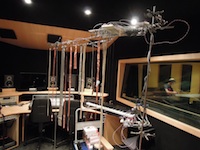
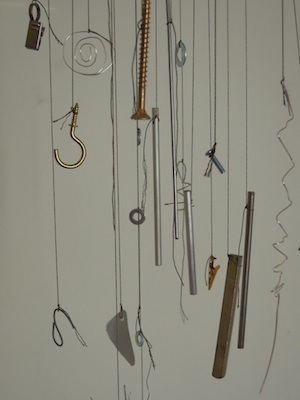
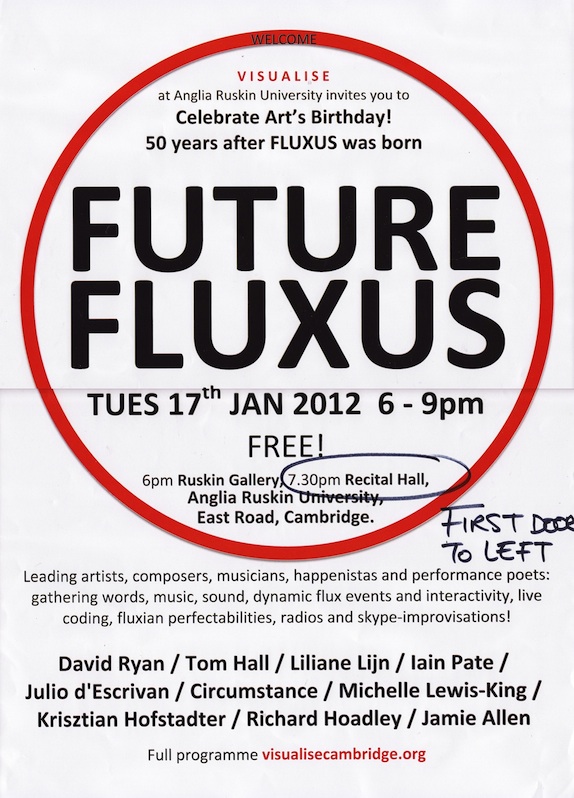
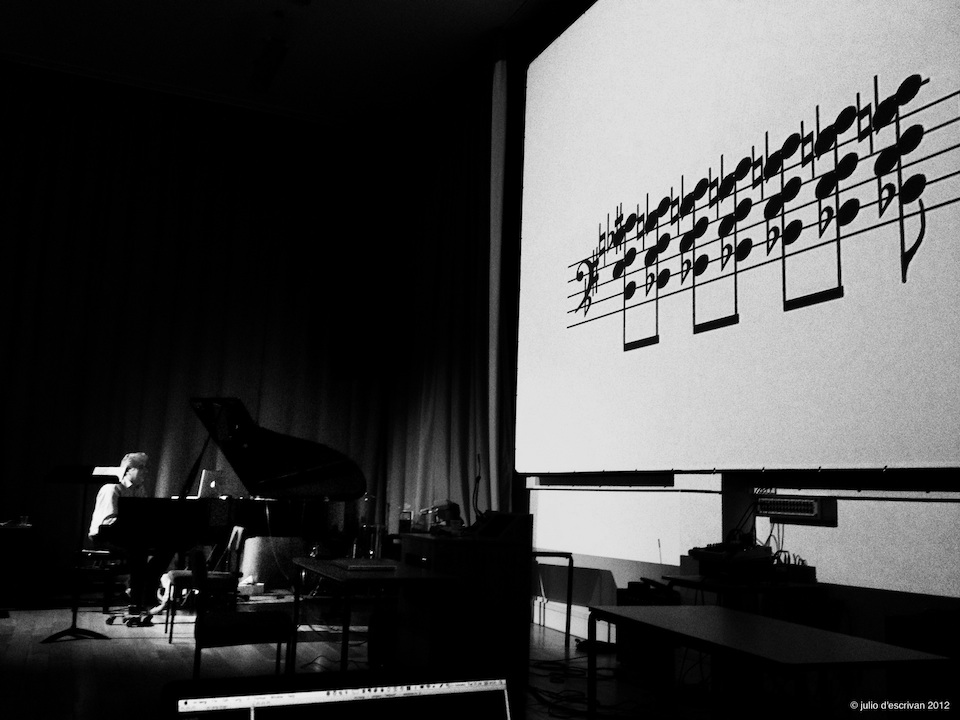
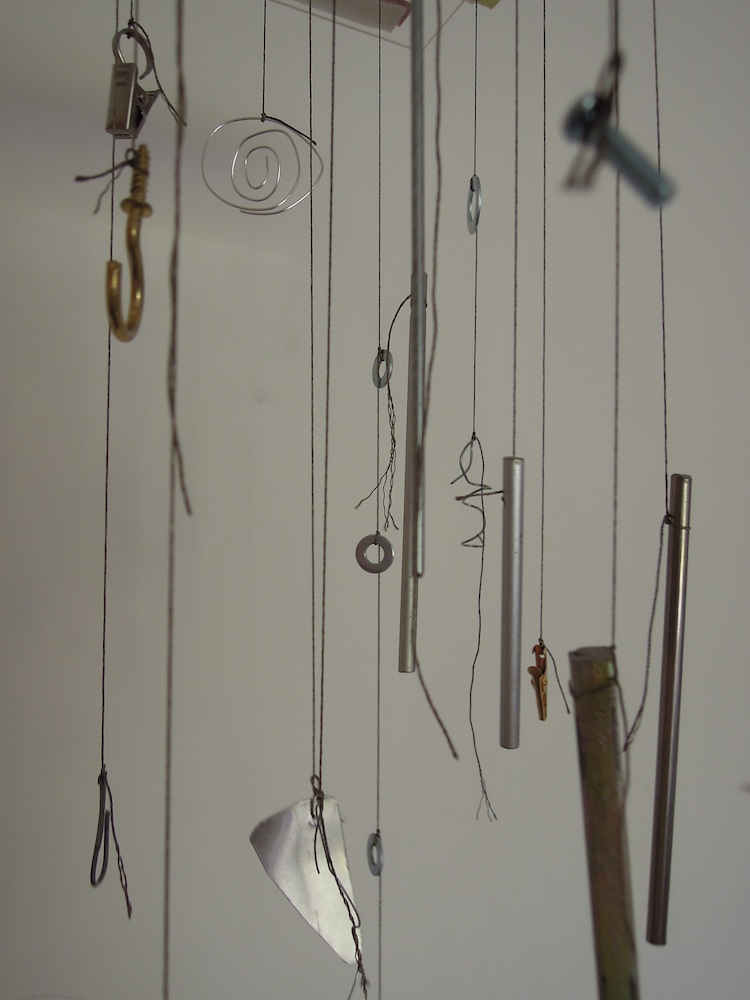
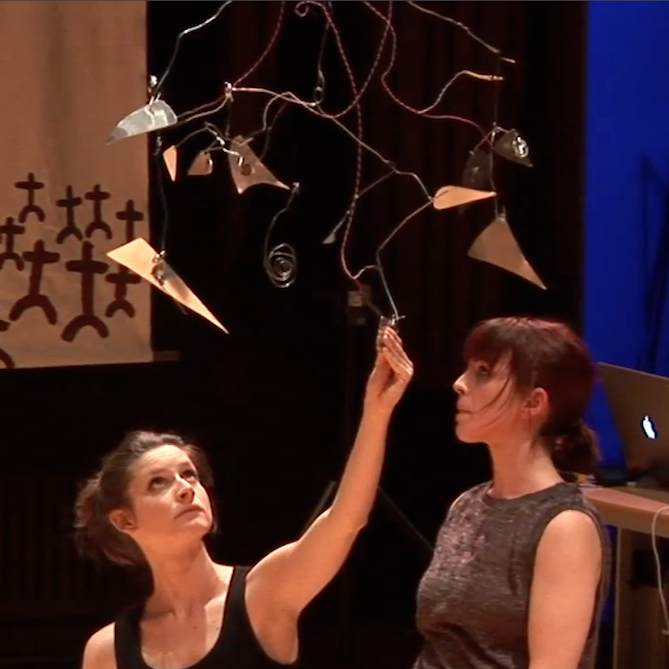
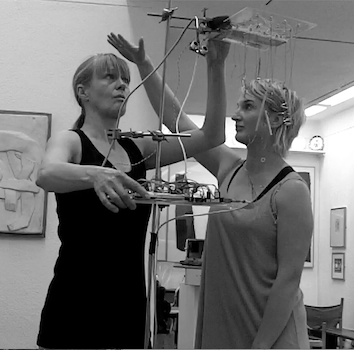
|